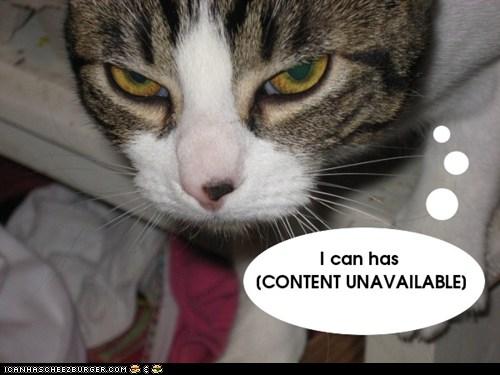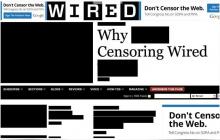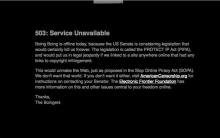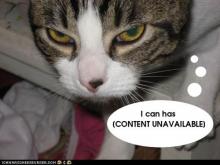The day the LOLcats almost died: coordinating the blackout against SOPA and PIPA
 It's been dubbed the biggest online protest in history. What was everyone so concerned about? The internet as we have come to know it: a space to create, remix and share information; a space where freedom and openness are integral to human rights.
It's been dubbed the biggest online protest in history. What was everyone so concerned about? The internet as we have come to know it: a space to create, remix and share information; a space where freedom and openness are integral to human rights.
On January 18, 2012 around 75,000 websites – including such big names as Wikipedia, Flickr, Tumblr, Reddit and Vimeo – shut down and blacked out for 24 hours in protest against the United States' Stop Online Piracy Act (SOPA) and Protect Intellectual Property Act (PIPA). The blackouts were aimed at showing the pernicious and far-reaching effects that these laws would have if they were implemented. Groups like SopaStrike, Wikipedia and others provided information and tools so that others could also join the blackout and shut down their own websites for the day. A number of other protest actions were organised as well, from physical demonstrations to petition drives and boycotts of companies that supported the bills.
SOPA and PIPA were developed at the behest of corporations to try to prevent the sharing, downloading and exchange of music, movies, images, books and articles. The assumption underlying the legislation was that corporations own the rights to certain kinds of content and should receive money every time that content is shared or displayed. By this logic, all the content on Wikipedia is actually in violation of copyright, because it constantly references and uses other people's material. This is why Wikipedia was a high-profile member of the campaign against SOPA and PIPA.
SOPA and PIPA were misguided attempts to pin down pieces of information as discrete, almost physical entities, whose ownership can be traced. Yet this is in direct contradiction to the way in which information is currently used online. The right to share and reference diverse kinds of content in 'user generated' and 'crowdsourced' sites underpins much of our contemporary experience of the internet. Even the humble LolCat (photographs of cats with funny captions) relies on this principle.
PIPA is a broad piece of legislation that covers everything from the intellectual property associated with the creation of a song, to the formula for a complex medical pharmaceutical. With SOPA and PIPA, large swathes of online content, as well as intermediary websites hosting content deemed to be in violation of copyright, could be considered to be in violation of these laws.
A clever online campaign, whokilledtheinter.net, tries to show what the internet would look like if content were filtered out because of pieces of legislation like SOPA and PIPA and the Anti-Counterfeiting Trade Agreement (ACTA). Not much at all! And the web comic The Oatmeal explains with a very funny visual story just what this legislation means for everyone who creates images and videos to share on the internet.
According to sopastrike.com, more than 1 billion people saw anti-SOPA messages on January 18, and the protest had a palpable impact. At least 13 senators backed away from the bill and 5 co-sponsors dropped their support of it. A Congressional decision on both bills has been postponed.
FURTHER READING
A collection of examples showing the different ways organisations censored their websites to protest SOPA and PIPA, SF Gate, 2012.
SOPA Opera: a public from Pro Publica tracking which members of Congress support the bill, ProPublica.
SOPA Strike (including a timeline of the laws and protests)
Electronic Frontier Foundation
Fight for the Future


